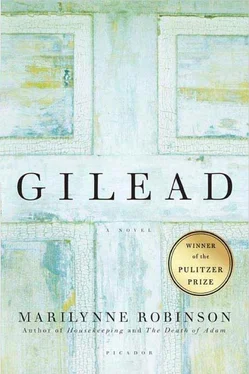So Jack Boughton is forty-three. I have no idea what sort of life he has had since he left here. There has never been any mention of marriage or children or of any particular kind of work. I always felt it was best not to inquire.
I was sitting there listening to old Boughton ramble along (he uses the expression himself) about a trip he and his wife made once to Minneapolis, when Jack broke in and said to me, “So, Reverend, I would like to hear your views on the doctrine of predestination.”
Now, that is probably my least favorite topic of conversation in the entire world. I have spent a great part of my life hearing that doctrine talked up and down, and no one’s understanding ever advanced one iota. I’ve seen grown men, God-fearing men, come to blows over that doctrine. The first thought that came to my mind was, Of course he would bring up predestination! So I said, “That’s a complicated issue.”
“Let me simplify it,” he said. “Do you think some people are intentionally and irretrievably consigned to perdition?”
“Well,” I said, “that may actually be the kind of simplification that raises more questions than it avoids.”
He laughed. “People must ask you about this all the time,” he said.
“They do.”
“Then I suppose you must have some way of responding.”
“I tell them there are certain attributes our faith assigns to God: omniscience, omnipotence, justice, and grace. We human beings have such a slight acquaintance with power and knowledge, so little conception of justice, and so slight a capacity for grace, that the workings of these great attributes together is a mystery we cannot hope to penetrate.”
He laughed. “You say it in those very words.”
“Yes, I do. More or less those very words. It’s a fraught question, and I’m careful with it.”
He nodded. “I take you to mean that you do believe in predestination.” “I dislike that word. It’s been put to crude uses.”
“Can you propose a better word?”
“Not offhand.” I felt he was deviling me, you see.
“I would like your help with this, Reverend,” he said, so seriously that I began to think he might be serious. “This is a grave issue, isn’t it? We’re not really dealing here with a mere word, a mere abstraction.”
“You’re right,” I said. “That’s true.”
“I assume predestination does not, in your understanding, mean that a good person will go to hell simply because he was consigned to hell from the beginning.”
Glory said, “Excuse me. I’ve heard this argument a thousand times and I hate it.”
Old Boughton said, “I hate this conversation a good deal myself and I’ve never seen it go anywhere. I wouldn’t really call this an argument, though, Glory.”
“Wait five minutes,” she said. She got up and walked into the house, but your mother sat still, listening.
Jack said, “I’m the amateur here. I suppose if I had your history with the question I’d be sick of it, too. Well, actually I believe I do have a history with it. I have had reason to wonder fairly often about it. I hoped you would instruct me a little.”
“I don’t believe a person can be good in any meaningful sense and also be consigned to perdition. Nor do I believe that a person who is sinful in any sense is necessarily consigned to perdition. Scripture clearly says otherwise in both cases.” “I’m sure it does. But are there people who are simply born evil, live evil lives, and then go to hell?”
“On that point Scripture is not so clear.”
“What does your own experience suggest, Reverend?” “Generally, a person’s behavior is consistent with his nature. Which is only to say his behavior is consistent. The consistency is what I mean when I speak of his nature.” I recognized a redundancy there, a circularity. He smiled. “People don’t change, then,” he said.
“They do, if there is some other factor involved — drink, or some sort of personal influence. That is, their behavior changes. Whether that means their nature changes or that another aspect of it becomes visible is hard to say.”
He said, “For a man of the cloth, you’re pretty cagey.”
That made old Boughton laugh. “You should have seen him thirty years ago.”
“I did.”
“Well,” his father said, “you should have been paying attention.”
Jack shrugged. “I was.”
Now, that got to me a little. I don’t know why Boughton would have led him on like that. Cagey at checkers, maybe. I said, “I’m just trying to find a slightly useful way of saying there are things I don’t understand. I’m not going to force some theory on a mystery and make foolishness of it, just because that is what people who talk about it normally do.”
Your mother looked at me, so I knew I must have sounded upset. I was upset. Nine-tenths of the time when some smart aleck starts in on theological questions he’s only trying to put me in a false position, and I’m just too old to see the joke in it anymore. Then Glory came to the door and said, “Your five minutes aren’t up yet,” as if anyone needed to underscore the futility.
But your mother spoke up, which surprised us all. She said, “What about being saved?” She said, “If you can’t change, there don’t seem much purpose in it.” She blushed. “That’s not what I meant.”
“You’ve made an excellent point, dear,” Boughton said. “I worried a long time about how the mystery of predestination could be reconciled with the mystery of salvation. I remember thinking about that a great deal.”
“No conclusions?” Jack asked.
“None that I can remember.” Then he said, “To conclude is not in the nature of the enterprise.”
Jack smiled at your mother as if he was looking for an ally, someone to share his frustration, but she just sat very still and studied her hands.
“I should think,” he said, “that the question Mrs. Ames has raised is one you gentlemen would approach with great seriousness. I know you have attended tent meetings only as interested observers, but — Excuse me. I don’t believe anyone else wants to pursue this, so I’ll let it go.” Your mother said, “I’m interested.”
Old Boughton, who was getting a little ruffled, said, “I hope the Presbyterian Church is as good a place as any to learn the blessed truths of the faith, including redemption and salvation first of all. The Lord knows I have labored to make it so.”
“Pardon me, Father,” Jack said. “I’ll go find Glory. She’ll tell me how to make myself useful. You always said that was the best way to keep out of trouble.”
“No, stay,” your mother said. And he did.
There was an uneasy silence, so I remarked that he might find Karl Barth a help, just for the sake of conversation. He said, “Is that what you do when some tormented soul arrives on your doorstep at midnight? Recommend Karl Barth?”
I said, “It depends on the case,” which it does. I have found Barth’s work to be full of comfort, as I believe I have told you elsewhere. But in fact, I don’t recall ever recommending him to any tormented soul except my own. That is what I mean about being put in a false position.
Your mother said, “A person can change. Everything can change.” Still never looking at him.
He said, “Thanks. That’s all I wanted to know.”
So that was the end of the conversation. We went home to supper.
I was left wondering what he was referring to when he mentioned tent meetings. And I have thought a lot about that word “cagey.” I have always dreaded having to talk theology with people who have no sympathy for it. I’ve been evasive from time to time, that’s true. I see the error of assuming a person is not speaking with you in good faith. It’s not respectful, I know that, and I don’t do it often. Nor do I have much occasion to around here, where it seems as if I’ve baptized half the people I pass on the street and taught them all the theology they will ever know.
Читать дальше












